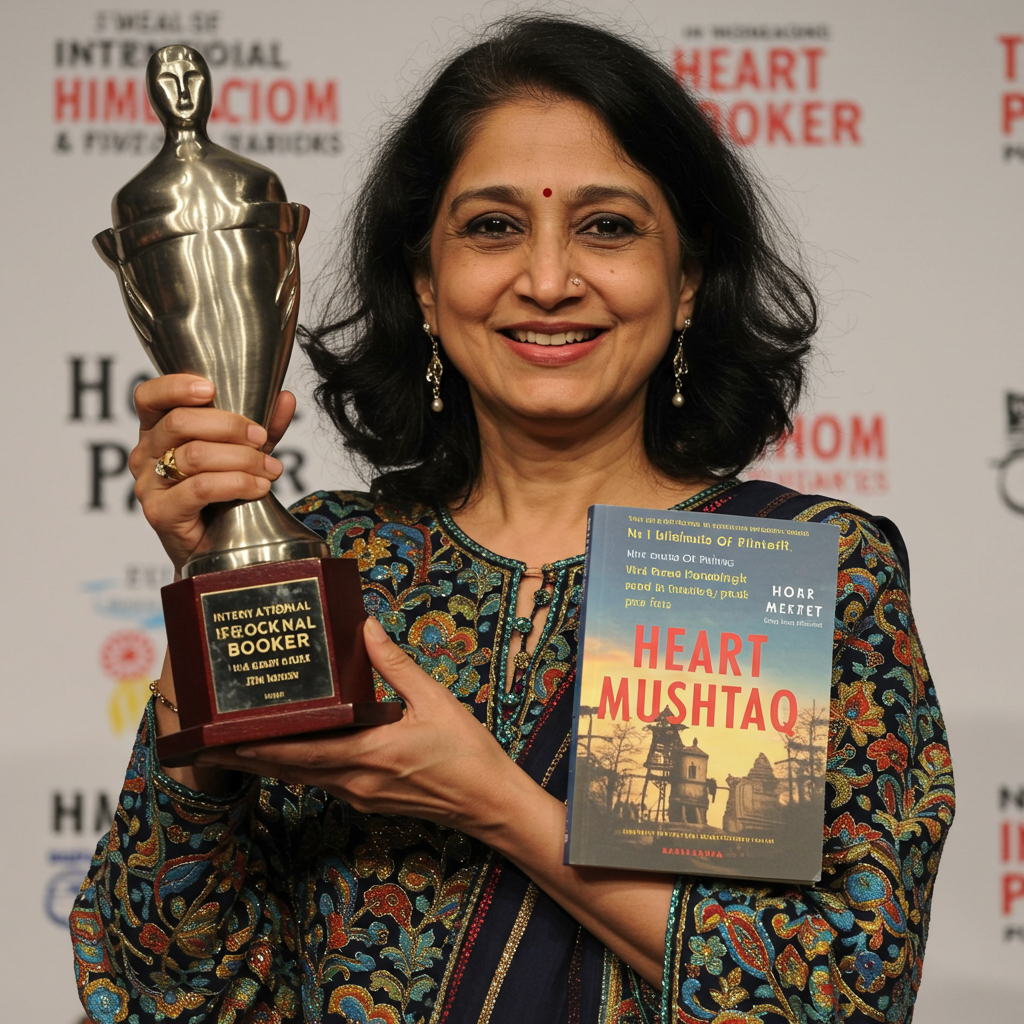Indian writer, lawyer, and activist Banu Mushtaq has achieved a landmark literary milestone, winning the coveted International Booker Prize for her poignant short story collection, Heart Lamp. This victory marks a historic first for several reasons: Mushtaq is the first author writing in the Kannada language to receive the award, and Heart Lamp is the first collection of short stories ever to win the prestigious prize in its current format.
The International Booker Prize celebrates the best fiction translated into English, and this year, the spotlight shines brightly on Mushtaq’s powerful narratives from southern India.
Exploring Lives at the Edges in ‘Heart Lamp’
Heart Lamp is an anthology featuring 12 short stories penned by Mushtaq between 1990 and 2023. The collection offers intimate and often difficult portrayals of the lives of Muslim women and girls in southern India, exploring themes of hardship, survival, and resilience.
Judges praised the characters in Heart Lamp as “astonishing portraits of survival and resilience.” The stories delve into complex social issues, including faith, caste, class, power dynamics, reproductive rights, and the multifaceted impacts of oppression rooted in religious conservatism and patriarchal systems. Reviewers note that Mushtaq’s writing refuses to flatten these women into simple tropes, instead showing them as individuals who “endure, negotiate, and occasionally push back” against societal constraints.
A Collaborative Triumph: Banu Mushtaq and Deepa Bhasthi
The International Booker Prize recognizes both the author and the translator, and the £50,000 award will be split equally between Mushtaq and Deepa Bhasthi. Bhasthi’s translation of Heart Lamp from Kannada into English is itself a groundbreaking achievement, making her the first Indian translator to win the prize.
Bhasthi’s approach to translation was particularly noted by the judges. Instead of aiming for an “invisible” or standard English style, she deliberately retained Indian expressions and linguistic nuances, creating what she describes as “translating with an accent.” This method ensures the translation carries the distinct “hum” of the original language, preserving cultural specificity while making the stories accessible to English readers. To prepare for the translation, Bhasthi immersed herself in the community depicted, watching Pakistani dramas, listening to specific music, and even learning Urdu script to better understand the linguistic and cultural landscape.
From Personal Struggle to Universal Resonance
Banu Mushtaq’s own extraordinary life deeply informs her writing. Now 77, her journey from a young girl in a Muslim neighbourhood in Karnataka, learning Urdu, to embracing Kannada through her father’s encouragement and pursuing higher education despite societal expectations, mirrors the resilience found in her characters.
Her writing career blossomed during a challenging period in her early marriage, a time she has openly discussed as marked by conflict and domestic restrictions, including pressure to wear a burqa and dedicate herself solely to domestic work, and experiencing postpartum depression. In a moment of profound despair, an attempted act of defiance became a turning point. This spirit of resistance, even in the face of immense personal difficulty, is palpable in her characters. As one review notes, they “dissent, rage, and rebel in ways big and small.”
Mushtaq’s commitment to highlighting social injustices is also rooted in her broader career. She worked as a reporter and was associated with the Bandaya movement, which used literature and activism to address social and economic inequalities. Later, she became a lawyer, often finding inspiration for her stories in the daily incidents and struggles shared by women seeking her help, describing her heart as her “field of study.”
Writing Truth in the Face of Opposition
Mushtaq’s incisive writing and outspoken views have not been without consequence. In 2000, after she publicly supported women’s right to pray in mosques, she received death threats, faced a fatwa, and survived an attempted physical attack. Yet, these incidents did not deter her fierce honesty. She has consistently challenged chauvinistic religious interpretations, noting that while society changes, “the basic struggles of women and marginalised communities continue.”
Before this International Booker win, Mushtaq had already received numerous accolades in India, including the Karnataka Sahitya Academy Award. Her earlier collection, Haseena and Other Stories, won the PEN Translation Prize in 2024.
Significance of the Win
Banu Mushtaq’s victory follows Geetanjali Shree’s win for Tomb of Sand in 2022, further cementing the growing international recognition for Indian literature in translation.
In her acceptance speech, Mushtaq eloquently stated her belief that “no story is ever small; that in the tapestry of human experience, every thread holds the weight of the whole.” She highlighted literature’s unique power as “one of the last sacred spaces where we can live inside each other’s minds, if only for a few pages.” She described the win as like “a thousand fireflies lighting up a single sky,” viewing her book as a “love letter” that challenges the notion of any story being merely “local.”
The win of Heart Lamp not only celebrates Banu Mushtaq’s enduring literary power and her focus on lives often overlooked but also underscores the vital role of translation in bringing these essential, universally resonant stories to a global audience, proving that a story originating in a southern Indian village can indeed reach the world stage.
References
- https://www.bbc.com/news/articles/c308qjpz9y2o
- https://www.bbc.co.uk/news/articles/c308qjpz9y2o
- https://www.npr.org/2025/05/20/nx-s1-5399605/international-booker-prize-winner-heart-lamp
- https://americankahani.com/lead-stories/breaking-barriers-kannada-writer-banu-mushtaqs-heart-lamp-makes-history-winning-international-booker-prize/
- https://www.the-independent.com/arts-entertainment/books/news/banu-mushtaq-heart-lamp-international-booker-prize-winner-b2754910.html



